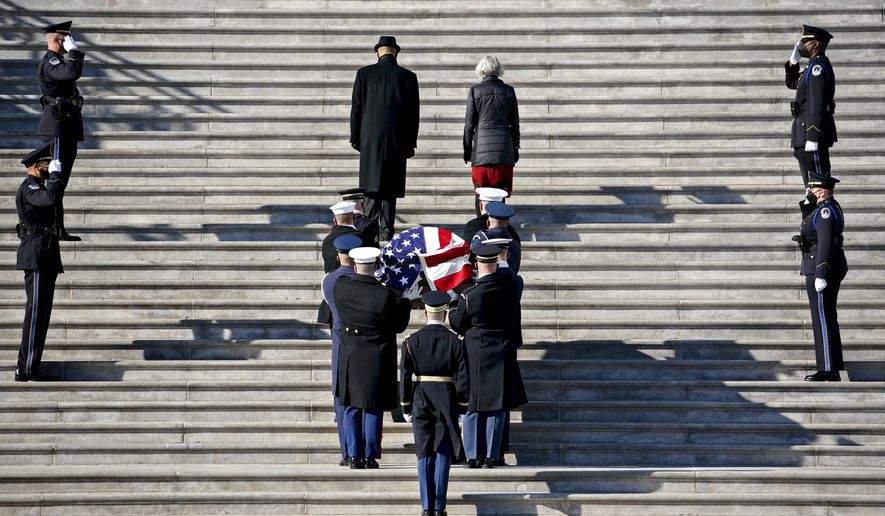WASHINGTON (AP) — Former Sen. Harry Reid lay in state Wednesday in the U.S. Capitol Rotunda as colleagues and friends gathered to pay tribute to a hardscrabble Democrat who rose from poverty in a dusty Nevada mining town to the most powerful position in the U.S. Senate.
The casket carrying Reid arrived at the Capitol as senators and others began filing into the Capitol Rotunda for a ceremony closed to the public under COVID-19 protocols. Reid died last month at 82 after a four-year battle with pancreatic cancer.
The longest-serving Nevadan in Congress and the Senate majority leader alongside two presidents, Reid helmed the chamber during one of its more consequential legislative sessions — securing the economic recovery bill during the Great Recession and President Barack Obama’s landmark health care law.
President Joe Biden called Reid a “great American,” one who “looked at the challenges of the world and believed it was within our capacity to do good, to do right.”
The Democratic leaders, Speaker Nancy Pelosi and Senate Majority Leader Chuck Schumer, are among those expected to speak at the tribute.
During a funeral service last weekend in Las Vegas, Biden, Obama and others recalled one of Reid’s best-known traits — abruptly hanging up on people, even presidents, rather than close with lengthy goodbyes.
The few words Reid did say were often flinty and fiery, the senator unafraid to take on presidents (he called George W. Bush a “loser”), criticize the fossil fuel industry (“coal makes us sick”) or declare the war in Iraq “lost.” He titled his 2008 autobiography “The Good Fight.”
Influential in retirement, Reid said Biden should give his new presidency just three weeks to try to work with Republicans. If not, Biden should force changes in the Senate’s filibuster rules to allow simple majority passage of elections and voting rights legislation and other priorities, Reid said.
“The time’s going to come when he’s going to have to move in and get rid of the filibuster,” Reid told The Associated Press.
Reid was born in the desolate mining town of Searchlight, Nevada, his father a hard-rock miner who later committed suicide, his mother doing laundry at home for bordellos. (He and other kids would swim in a brothel’s pool.) Searchlight was a place, he said, that “had seen its better days.”
The town had no churches, his family no religion. But a picture of President Franklin D. Roosevelt hanging in the Reid home would influence his political career.
Reid hitchhiked some 40 miles to attend high school and joined The Church of Jesus Christ of Latter-day Saints as he made his way through college and law school. An amateur boxer, he once leveled a punch at his future father-in-law after being denied a date with Landra Gould, who would become his wife. They were married for 62 years.
First elected to the House in 1982 and reelected in 1984, Reid then served 30 years in the Senate, including a decade as the Senate Democratic leader.
Along the way, Reid rewrote the map of Nevada by expanding public lands, halting the planned Yucca Mountain nuclear waste outside of Las Vegas; and securing national monument status around artist Michael Heizer’s “City” installation in the desert. He quietly ensured federal funding to research UFOs.
A man of few words, Reid often wrote notes instead — to family, colleagues and a Nevada student advocate who had reached out on immigration law changes. He championed the Dream Act and Obama’s Deferred Action for Childhood Arrivals to protect young immigrants in the U.S. without legal status from deportation.
As his power rose, Reid engineered a Democratic legacy for his state with Nevada’s early presidential caucus. He left behind a state party apparatus that was sometimes referred to as the “Reid Machine” for its enduring political power seeking to elect the next generation of Democratic leaders.
After suffering an exercise accident at home, and with Democrats back in the Senate minority, Reid announced he would not seek reelection in 2016.
In his farewell address to the Senate, he acknowledged he had done things that “probably a lot of people wouldn’t do.” But he passed on his advice to those wondering how he made it from Searchlight to Washington.
“I didn’t make it because of my good looks. I didn’t make it because I am a genius. I made it because I worked hard,” Reid said. “Whatever you want to try to do, make sure you work as hard as you can to try to do what you want to do.”




Please read our comment policy before commenting.